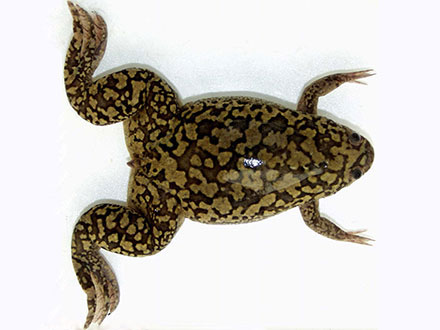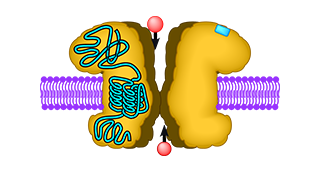Modulation of Glutamate Receptors by Auxiliary Proteins
 The oocytes of the South African clawed toad Xenopus laevis are used for the expression and functional characterisation of mammalian glutamate receptors. To be able to interpret the results of such experiments properly, it is important to know whether the oocytes express glutamate receptors endogenously and, if so, how they function. Therefore, we search for Xenopus glutamate receptors in oocytes and analyse their function.
The oocytes of the South African clawed toad Xenopus laevis are used for the expression and functional characterisation of mammalian glutamate receptors. To be able to interpret the results of such experiments properly, it is important to know whether the oocytes express glutamate receptors endogenously and, if so, how they function. Therefore, we search for Xenopus glutamate receptors in oocytes and analyse their function.
Project-Related Publications
- C. Schmidt and M. Hollmann (2009).
Molecular and functional characterization of Xenopus laevis N-methyl-D-aspartate receptors.
Molecular and Cellular Neuroscience 42(2): 116-127.
doi: 10.1016/j.mcn.2009.06.004
Abstract
- C. Schmidt, C. Klein, and M. Hollmann (2009).
Xenopus laevis oocytes endogenously express all subunits of the ionotropic glutamate receptor family.
Journal of Molecular Biology 390(2): 182-195.
doi: 10.1016/j.jmb.2009.05.008
Abstract
- C. Schmidt and M. Hollmann (2008).
Apparent homomeric NR1 currents observed in Xenopus oocytes are caused by an endogenous NR2 subunit.
Journal of Molecular Biology 376(3): 658-670.
doi: 10.1016/j.jmb.2007.11.105
Abstract
- C. Schmidt, M. Werner, and M. Hollmann (2006).
Revisiting the postulated “unitary glutamate receptor”: Electrophysiological and pharmacological analysis in two heterologous expression systems fails to detect any evidence for its existence.
Molecular Pharmacology 69(1): 119-129.
doi: 10.1124/mol.105.016840
Abstract
Project-Related Doctoral Theses
- Carsten Schmidt
Investigations on Xenopus laevis glutamate receptors
Download thesis as pdf (14.5 MB)
Project-Related Master Theses
- Carsten Schmidt
Cloning and functional characterisation of Xenopus laevis glutamate receptors
01.11.2003 to 14.06.2004
Project-Related Bachelor Theses
- Michael Storcksdiek genannt Bonsmann
Investigation of the postulated Xenopus laevis unitary glutamate receptor: Potential role of previously disregarded Xenopus NMDA receptor splice variants
09.10.2006



 Dr. Carsten Schmidt
Dr. Carsten Schmidt